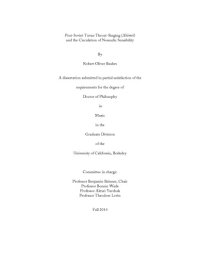
Ebook: Post-Soviet Tuvan Throat-Singing ( Xöömei ) and the Circulation of Nomadic Sensibility
Author: Robert Oliver Beahrs
- Genre: Other Social Sciences // Ethnography
- Year: 2014
- Publisher: University of California
- City: Berkeley
- Language: English
- pdf
Guttural singing practices in the Sayan-Altai region of south-central Siberia have been historically framed as possessing “nomadic” qualities linked with pastoral population groups indigenous to the region. As these singing practices were incorporated into a genre of national folk music for Tannu Tuva (1921-1944) and the Tuvan Autonomous Soviet Socialist Republic (1961-1991)— and then later reformulated as the centerpiece of an exotic genre of world music — xöömei throat-singing was shaped by contradictory attitudes towards its purportedly nomadic characteristics, which have been essentialized at various times, for multiple reasons, by local and global actors and interest groups. In the post-Soviet era, xöömeizhi (master throat-singers) from the Tuva Republic (now part of Russia) express a revitalized nomadic sensibility through xöömei singing practices, which has come to operate both as an ideology and a disposition for Tuvan traditional
music. Drawing on a selective use of history, cultural memory, and natural environments, post-Soviet xöömeizhi construct a nomadic sensibility that is embodied in music and sound-making activities, foregrounded in intercultural exchanges, and circulated as a social disposition.
Guttural singing practices in the Sayan-Altai region of south-central Siberia have been historically framed as possessing “nomadic” qualities linked with pastoral population groups indigenous to the region. As these singing practices were incorporated into a genre of national folk music for Tannu Tuva (1921-1944) and the Tuvan Autonomous Soviet Socialist Republic (1961-1991)— and then later reformulated as the centerpiece of an exotic genre of world music — xöömei throat - singing was shaped by contr adictory att itudes towards its purportedly nomadic characteristics, which have been essentialized at various times, for multiple reasons, by local and global actors and interest group s . In the post - Soviet era, xöömeizhi (master throat - singers) from the Tuva Republic ( now part of Russia) express a revitalized nomadic sensibility through xöö mei singing practices, which has come to operate both as an ideology and a disposition for Tuvan traditional music. Drawing on a selective use of history, cultural memory, and natural environments, post - Soviet xöömeizhi construct a nomadic sensibility that is embodied in music and sound - making activities, foregrounded in intercultural exchanges, and circulated as a social disposition.
Guttural singing practices in the Sayan-Altai region of south-central Siberia have been historically framed as possessing “nomadic” qualities linked with pastoral population groups indigenous to the region. As these singing practices were incorporated into a genre of national folk music for Tannu Tuva (1921-1944) and the Tuvan Autonomous Soviet Socialist Republic (1961-1991)— and then later reformulated as the centerpiece of an exotic genre of world music — xöömei throat - singing was shaped by contr adictory att itudes towards its purportedly nomadic characteristics, which have been essentialized at various times, for multiple reasons, by local and global actors and interest group s . In the post - Soviet era, xöömeizhi (master throat - singers) from the Tuva Republic ( now part of Russia) express a revitalized nomadic sensibility through xöö mei singing practices, which has come to operate both as an ideology and a disposition for Tuvan traditional music. Drawing on a selective use of history, cultural memory, and natural environments, post - Soviet xöömeizhi construct a nomadic sensibility that is embodied in music and sound - making activities, foregrounded in intercultural exchanges, and circulated as a social disposition.
Download the book Post-Soviet Tuvan Throat-Singing ( Xöömei ) and the Circulation of Nomadic Sensibility for free or read online
Continue reading on any device:

Last viewed books
Related books
{related-news}
Comments (0)